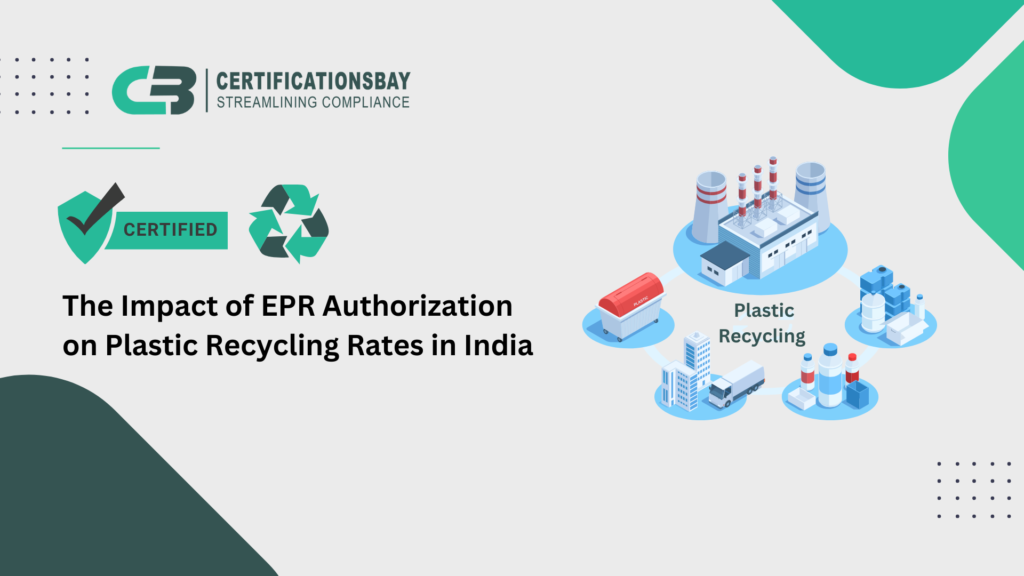
Introduction
In recent years, India has taken significant steps to address the growing problem of plastic waste. One of the most impactful measures is the implementation of Extended Producer Responsibility (EPR) authorization, a policy designed to ensure that producers, importers, and brand owners take responsibility for the entire lifecycle of their plastic products. By shifting the burden of waste management onto those who introduce plastic into the market, EPR has the potential to revolutionize recycling rates across the country.
This article delves into how EPR Registration has influenced plastic recycling rates in India, exploring both the successes and the ongoing challenges.
What Is EPR Authorization?
At its core, EPR is a policy mechanism that compels businesses to manage the waste generated by their products. In India, the Plastic Waste Management Rules, 2016, mandate that companies not only produce and sell plastic products but also take responsibility for their collection, recycling, and disposal. EPR Registration is the formal approval required from the Central Pollution Control Board (CPCB), ensuring that a company’s waste management practices meet regulatory standards.
How EPR Authorization Boosts Recycling Rates
Holding Producers Accountable
- EPR authorization has placed the responsibility for plastic waste directly on the producers. This has led to a more organized and structured approach to waste management, where companies are actively involved in the collection and recycling process. As a result, there’s been a noticeable increase in plastic recycling rates.
Formalizing the Recycling Industry
- The requirement for producers to partner with authorized recyclers has led to the formalization of the recycling sector in India. This shift has improved the efficiency and scale of recycling operations, making it easier to manage the large volumes of plastic waste generated across the country.
Driving Investments in Infrastructure
- With EPR authorization comes the need for better infrastructure. Companies are now investing in advanced recycling technologies and facilities, which has not only increased the country’s recycling capacity but also led to the creation of new jobs within the sector.
Raising Public Awareness
- Many companies have taken the initiative to educate consumers about the importance of recycling as part of their EPR commitments. These awareness campaigns have led to better waste segregation at the source, further boosting recycling rates.
Challenges Hindering EPR’s Full Potential
While EPR authorization has made a positive impact, several obstacles remain:
Inconsistent Implementation Across States
- The effectiveness of EPR varies significantly across different states in India. While some regions have fully embraced the policy, others are still catching up, leading to a patchwork of recycling rates across the country.
Informal Sector Dynamics
- The informal sector still plays a major role in waste management in India. However, its integration into the formal recycling system remains a challenge, largely due to the lack of resources and infrastructure needed to comply with EPR requirements.
Monitoring and Enforcement Difficulties
- Ensuring that all producers comply with EPR regulations is a daunting task, especially given the sheer volume of plastic waste and the number of companies involved. The current system of monitoring and enforcement needs to be strengthened to prevent non-compliance.
Cost Barriers for Smaller Businesses
- For small and medium-sized enterprises (SMEs), the cost of meeting EPR obligations can be substantial. The financial burden of establishing collection systems and partnering with authorized recyclers can deter smaller companies from fully complying with the rules.
Looking Ahead: Enhancing EPR’s Impact
To maximize the impact of EPR on plastic recycling rates, several steps should be considered:
Strengthen Policy Enforcement
- A more consistent and rigorous approach to enforcing EPR regulations across all states is crucial. This could be achieved through better coordination between central and state pollution control boards, as well as the introduction of stricter penalties for non-compliance.
Provide Incentives for Exceeding Targets
- Introducing incentives for companies that go above and beyond their recycling targets could further enhance participation in EPR. These could include tax breaks, subsidies, or public recognition for outstanding efforts in waste management.
Support the Informal Sector
- Integrating the informal sector into the formal recycling system is essential for improving plastic recycling rates. This could involve providing training, financial support, and necessary infrastructure to empower informal workers to comply with EPR regulations.
Promote Public-Private Partnerships
- Collaboration between government bodies, private companies, and non-governmental organizations (NGOs) could help bridge the gaps in resources and infrastructure. Public-private partnerships could lead to the development of more effective and scalable recycling solutions.
Conclusion
EPR authorization has made significant strides in improving plastic recycling rates in India by making producers accountable for their waste. However, challenges such as inconsistent implementation, the integration of the informal sector, and high compliance costs must be addressed to fully realize its potential. With continued effort and collaboration, EPR can play a transformative role in creating a sustainable future for India, driving the country closer to a circular economy.
